Global sustainable certification puts Indonesian fisheries on the map
Global sustainable certification puts Indonesian fisheries on the map by Global Marine Commodities Project on Exposure
Global sustainable certification puts Indonesian fisheries on the map by Global Marine Commodities Project on Exposure
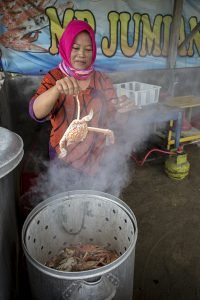
Nining working at the Jumiang Indah processing plan.
This year´s celebration of World Fisheries Day gives us another opportunity to reprise the importance of protecting our fishers and ensuring nutritious, safe, and sustainable seafood on our table. These fishers include Nining and Abdul Harris, a couple based in the East Java town of Pamekasan who are among the 90,000 fishers from across the country who specialize in catching the crab species called rajungan in Bahasa Indonesia. They also include Anderson Maluengseng, a third-generation pole-and-line tuna fisher from Indonesia, and his crew of 35 fishers who are part of an estimated 24,500 Indonesians who fish for yellowfin and skipjack tuna using the traditional pole-and-line technique.
Since 2018, the Ministry of National Development Planning of the Republic of Indonesia (BAPPENAS) and the United Nations Development Programme (UNDP) through the Global Marine Commodities (GMC) Project have collaborated with the Indonesian Blue Swimming Crab Association (APRI) and the Indonesian Pole & Line and Handline Fisheries Association (AP2HI) to accelerate mainstreaming sustainability in the Blue Swimming Crab (BSC) and tuna pole and line fisheries.
As a one of main global producers for fish, Indonesia’s actions and progress in managing its fisheries, to some extent, will always have an impact on world fisheries. For example, in challenging illegal fishing in its waters, Indonesia is contributed to shedding light on an illegal practice that is widely accepted as a key driver of global overfishing, as well as its various links to major human rights violations.
Notably, in the last decades Indonesia also has become one of the major countries that implements fishery improvement projects (FIPs), a multi-stakeholder effort to promote the sustainability of a given fishery (whether or not the fishery intends to pursue ecolabel certification). A FIP identifies the environmental issues that need to be addressed, sets the priority actions to be undertaken and oversees the action plan adopted, which generally covers three aspects: stock health, impact to the environment, and effective management.
During the period of the GMC Project’s work with fisheries industries and the Government of Indonesia, the FIPs are continuing to make a difference in Indonesia and the global fishery landscape. This progress is also noticed by the government.
“The journey of the pole and line tuna fishery towards ecolabel certification is anticipated to generate lessons and best practices as well as motivation for other Indonesian fisheries that also seek to enter global markets for sustainable seafood” said Sri Yanti, Director of Marine Affairs and Fisheries at BAPPENAS, during the development of new five-year National Tuna Management Plan last October 2019.
Another important progress is highlighted by Presidential Regulation No. 18/ 2020 on the National Medium-Term Development Plan (RPJMN) for 2020-2024, where Indonesia will accelerate implementation of Fishery Management Areas (known as Wilayah Pengelolaan Perikanan or WPP). Established by the Fisheries Law No 33/ 2004 which has been revised by Law No 45/ 2009, WPP is identified as a management area for fishing, aquaculture, conservation, research and fisheries development which includes inland waters, archipelago waters, territorial seas, additional zones, and Indonesia’s exclusive economic zone.
Utilising a regional approach, the implementation of WPP as a basis for fisheries development is expected to boost fisheries productivity which in turn optimises sectoral and regional growth. With Indonesia´s relatively diverse marine ecosystem, WPP is viewed as an effective approach to answer the complexity in the fishery and marine sector. Importantly, the WPP-based approach will play a role in providing a platform for integrating and harmonising the roles of at least 26 government agencies that are working on fisheries-related management, including consolidating all other non-public sector stakeholders to collaboratively address the issues through an integrated perspective.
“The WPP based approach utilises “regional led national management” that places regional and local participation as the main input to policy making, while policy makers at the national level play a role in providing guidance and formalizing fisheries management policies. This approach will create synergies, embrace regional characteristics, and reduce conflict”, said Arifin Rudiyanto, Deputy Minister for Maritime Affairs and Natural Resources, Ministry National Development Planning/ BAPPENAS, on a national webinar alongside other Director Generals in the Ministry of Marine Affairs and Fisheries, last April 2020, focusing on the transformation of WPP to improve the performance of the fisheries sector.
 Then came the global COVID-19 pandemic. Despite having affected the lives of millions of fishers in Indonesia, the Ministry of Marine Affairs of Fisheries reported that the fisheries sector was relatively unaffected economically by COVID-19. Unlike other sectors that experienced supply chain disruptions in the second and third quarter of 2020, the fisheries sector was able to maintain its stability throughout the quarters, and in fact showed a higher export performance compared to the previous year.
Then came the global COVID-19 pandemic. Despite having affected the lives of millions of fishers in Indonesia, the Ministry of Marine Affairs of Fisheries reported that the fisheries sector was relatively unaffected economically by COVID-19. Unlike other sectors that experienced supply chain disruptions in the second and third quarter of 2020, the fisheries sector was able to maintain its stability throughout the quarters, and in fact showed a higher export performance compared to the previous year.
This trend gives hope to the sector and will definitely become a foundation to optimise the performance of fisheries as a leverage for other sectors to rebuild, such as logistics, transportation, trade as well as food and consumption.
However, a precautionary approach must be strictly applied. It is widely known that several fish stock in Indonesia’s waters have been either overfished, or maximally sustainably fished, with few being underfished. Additionally, there are looming impacts of climate change which might be more critical given Indonesia’s position on the equator line.
Fortunately, we know that fisheries management works, and Indonesia has the tools to continue the path towards sustainable and productive fisheries. Importantly, Indonesia is also able to make choices to build better fisheries. For instance, in February of 2020, Indonesia launched the Harvest Strategy for BSC for areas around the Java Sea, which contributes nearly 50% of BSC to national production. This harvest strategy— the first of its kind in Indonesia—aims to maintain and/or improve reproductive capacity and ensure the sustainability of the blue swimming crab industry. Next in the process is a harvest strategy for tuna in the archipelagic waters and the updating of eleven fisheries management plans for WPP.
Clearly, Indonesia is the right path in progressing towards better and more sustainable fisheries. But the work is not done yet.
About the Global Marine Commodities Project (GMC)
The GMC Project is an interregional initiative implemented by the Ministries and Bureaus of Fisheries, Production and Planning of Costa Rica, Ecuador, Indonesia and the Philippines, with technical support of the United Nations Development Programme (UNDP), facilitated by the Sustainable Fisheries Partnership (SFP) and funded by the Global Environment Facility (GEF).
For more information on this Project please consult the project website. Alternatively, please contact the Indonesia´s Project Coordinator Jensi Sartin jensi.sartin@undp.org.
The last stock evaluation developed by the Research Public Institute of Aquaculture and Fishing (IPIAP) on the state of small pelagic species stocks in Ecuador, shows significant progress in the state of Frigate tuna, Pacific anchoveta, Pacific chub mackerel, Thread herrings, Shortfin scad and Round herring between 2017 and 2019.
The evaluation concluded that in 2017, 100 percent of the six small pelagic stocks were overexploited and 50 percent were overfished. In 2019, the results of the stock evaluation determined that two of the species, Frigate tuna and Thread herrings, had come out of their state of overexploitation and none of the small pelagic stocks in Ecuador were overfished.
Juan Javier Garcia Bodniza, Director of IPIAP affirmed “the development of the last stock evaluation shows that the joint efforts between the public and private sector is resulting in the recovery of pelagic populations. As the National Investigation authority for the fishery sector, our commitment and work will always be directed towards guiding science-based decision making to contribute towards the sustainability of fishery resources in Ecuador”.
Fishery improvement Project promotes sustainability measures
Beginning in 2018, due to the effort of 22 Ecuadorian companies involved in the small pelagics fish supply chain, with technical support from the United Nations Development Programme (UNDP) Global Sustainable Supply Chains for Marine Commodities (GMC) Project and its partner Sustainable Fisheries Partnership(SFP), the Small Pelagics Fishery Improvement Project (Small Pelagics FIP) was established with the objective of improving the sustainability of these resources through measurable and verifiable improvements in fishery management.
The GMC Project and its partner SFP provided seed funding to initiate the Small Pelagic FIP, and in return, the Ecuadorian private sector FIP implementers committed more than $1.5 million dollars to implement the FIP’s five-year work plan. This FIP aims to achieve sustainable certification from MARINE TRUST, a unique international programme for marine ingredient certification.
Among the actions implemented to date is the adoption of voluntary management measures to reduce fishing effort and improve the stock status and sustainability of the fishery. The fisheries closure season was extended (over two periods), with a total of 61 days in 2017, 77 days in 2018, 83 days in 2019 and 80 days in 2020; and a seven-day closure was established during the full moon each month.
“This FIP represents our desire to ensure a supply of fish for many future generations, and to work in an environment of respect for law and nature. This journey has been complicated and the economic environment has been challenging, with low captures in the last few years and the pandemic. Despite this, milestones have been reached and the state of the fishery has improved,” emphasized Carlos Cacao, President of the Small Pelagic Commission for the National Chamber of Fisheries (CNP).
In parallel, the Government of Ecuador is leading a participatory governance approach called a “Sustainable Marine Commodity Platform”. This intersectoral decision-making platform based on a global methodology promoted by the UNDP, includes government and private sector representatives, fishers, processers, scientists and civil society involvement. They work together in the development of an Action and Management Plan for the Small Pelagics Fishery, in this way allowing for the definition of policies to improve the environmental, social and economic performance of this fishery and serving as an example for other species, such as Mahi Mahi.
“Ecuador is demonstrating that structured processes that empower and promote public-private alliances contribute to strengthening participatory governances that, at the same time, helps improve the sustainability levels of fisheries and their supply chains. These results encourage the continuation of our work for the common objective of achieving the sustainability of fisheries resources”, highlighted Andres Arens, Ecuador´s Vice Minister of Aquaculture and Fisheries.
Small pelagics, key species for the Ecuadorian fishery industry
The small pelagic fishery is the second most important industrial fishery in Ecuador and is of great economic and social importance in the country. The extractive activity, landings, processing (canning and fish flour) and exports generate high levels of foreign exchange, and the fishery provides jobs to more than 25 000 employees.
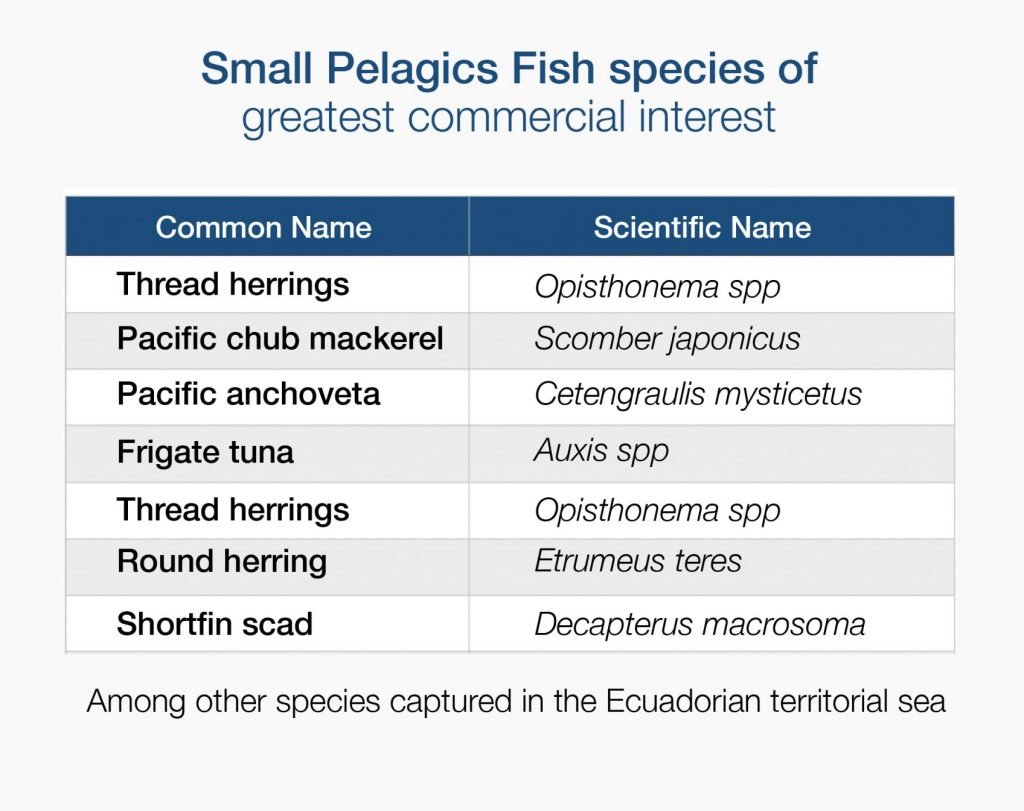
The resources considered in this fishery perform a key ecological role in marine ecosystems, and as such, the actions and commitment of different sectors not only contribute to achieving the sustainability of these resources but also serve as an example to be replicated in other fisheries and contribute to achieving the Sustainable Development Goals (SDGs) in Ecuador.
About the GMC Project
The Global Sustainable Supply Chains for Marine Commodities Project (GMC) is an interregional initiative implemented by the Ministries and Bureaus of Fisheries and Planning of Costa Rica, Ecuador, Indonesia and the Philippines, with technical support from the United Nations Development Programme (UNDP), facilitated by the Sustainable Fisheries Partnership (SFP) and funded by the Global Environment Facility (GEF).
Blog by:
Karen Hildahl, Monitoring and Evaluation Specialist, GMC/UNDP
Diego Orellana, International Project Coordinator ,GMC/UNDP
Enrique Alonso, Fisheries Coordinator, SFP
“Business as usual”. It was not long ago that we used this expression. However, the COVID-19 global pandemic has required us to rethink its meaning. The crisis has had profound impacts on the seafood sector, and on the livelihoods of industrial and small-scale fishers as a result. The food system has been disrupted all along the supply chain, from demand and supply to production. The pandemic has exposed the vulnerability of communities dependent on fisheries as a result of the informal status of the fishing activity. Women and men who work in unmanaged fisheries often lack access to basic rights and fishing communities that operate in the informal economy risk being left out of relief aid.
The current situation offers an opportunity to reflect on the state of fisheries prior to the COVID-19 crisis and highlights the need for a paradigm shift in the fisheries sector. On the demand side, there are still markets that do not distinguish where their fish come from and buy them without any sustainability requirements. On the supply side, illegal, unreported and unregulated (IUU) fishing continues to raise global challenges, and many fishers are left vulnerable as they operate under informal regimes.
The crisis is shedding light on the urgent need to strengthen management and enforcement as well as formality in the fishing sector. Economic reactivation measures post- COVID-19 should go hand in hand with improved fisheries governance. The GEF-funded UNDP/Global Marine Commodities (GMC) project and its partner Sustainable Fisheries Partnership (SFP), promote a multi-actor approach that can help prevent fisheries from slipping back into the pre- COVID-19 scenario, by avoiding destructive practices and achieving sustainable marine commodities. Actions implemented by the project are focused on:
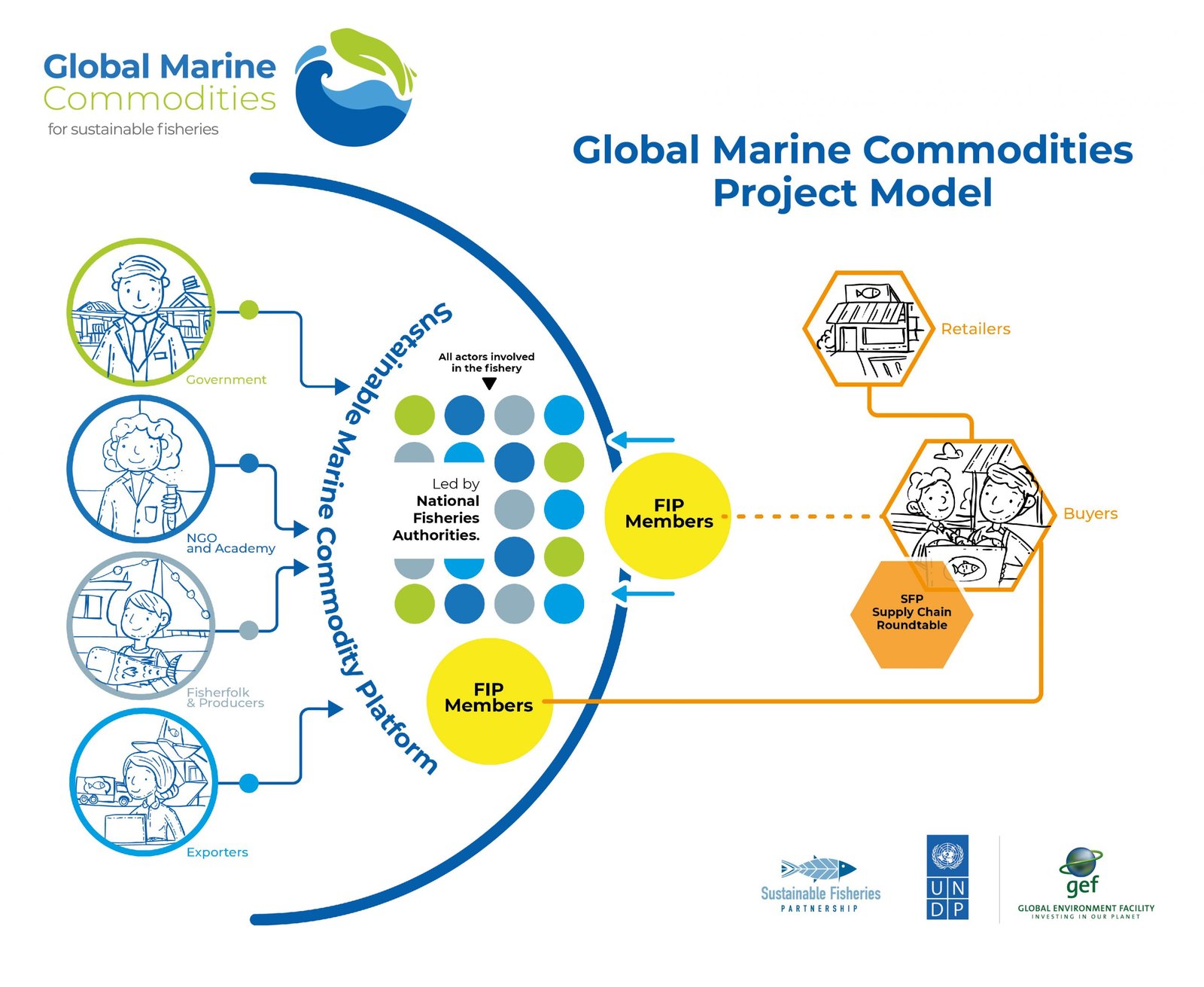
Global Marine Commodities Project Model
The COVID-19 pandemic has shown us that there is an opportunity to promote sustainable fisheries actions that involve the entire supply chain. The GMC Project works with international supply chains as well as domestic producers and processors. It serves as a test case of a comprehensive co-management model, integrating government-coordinated platforms, market-based tools and private sector led FIPs.
The private sector can steer change by developing and promoting the right set of incentives during the recovery process. Responsible businesses can broaden pre-competitive collaborations in support of global policy requirements that affect most of the fisheries they are involved with or depend on. They can join together to push for improved fisheries management as part of reactivation measures and renew commitments towards sustainable sourcing.
There is a need to further promote collaborations, learn lessons from this process, rethink strategies and promote more innovation in the future to address the issues raised by this crisis and continue to advance sustainable fisheries and human well-being.
A holistic approach for sustainable fisheries and a blue economy by Global Marine Commodities Project on Exposure
BLUE SWIMMING CRAB SUSTAINABILITY: PHILIPPINES’ SHARED GOAL by Global Marine Commodities Project on Exposure
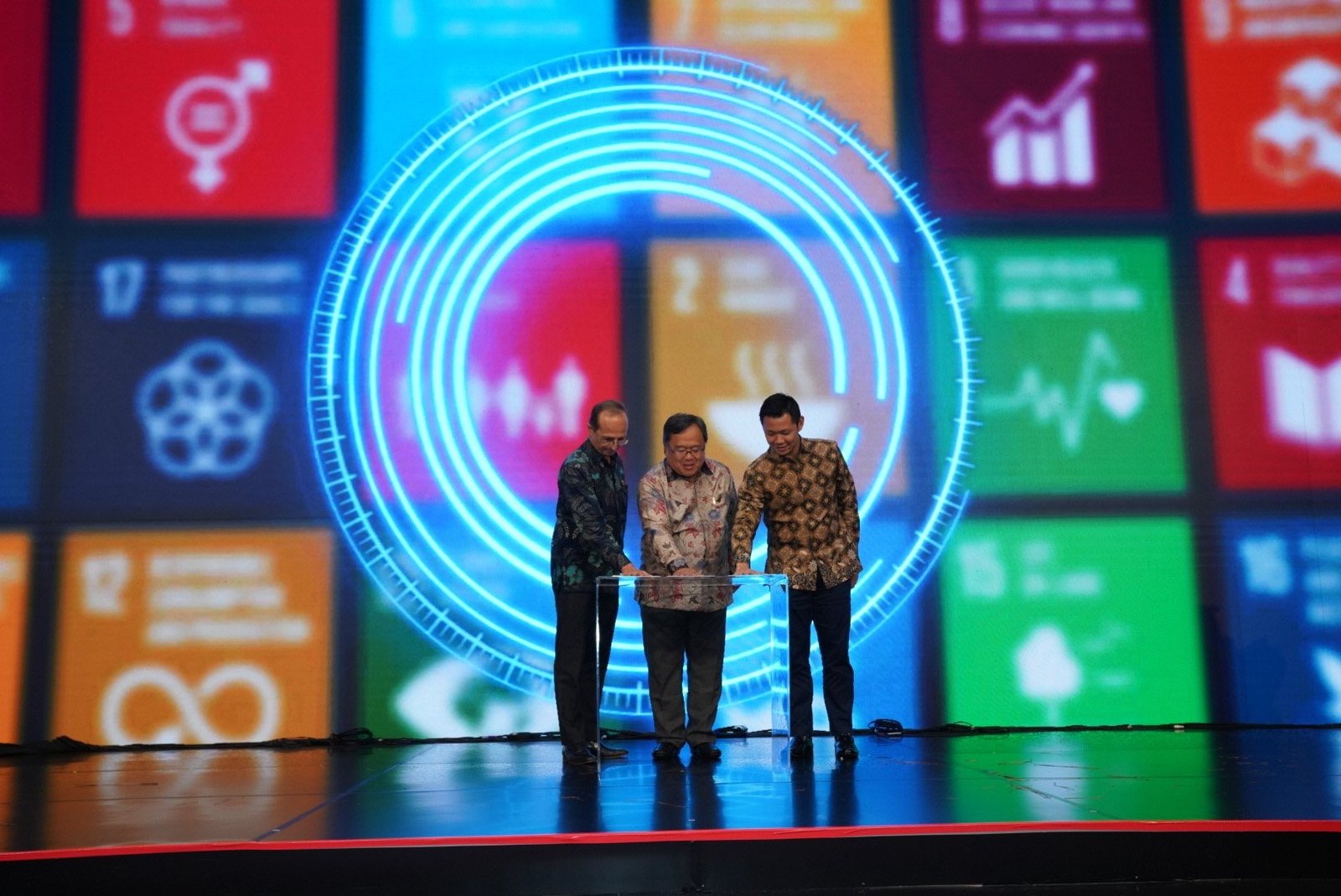 United Nations Development Programme (UNDP) and Ministry of National Development Planning/BAPPENAS host a plenary on Tuesday 8 October 2019, in Jakarta, to discuss the roles of Pesantren (Muslim boarding school in Indonesia) in supporting achievement of SDG14: Life Below Water.
United Nations Development Programme (UNDP) and Ministry of National Development Planning/BAPPENAS host a plenary on Tuesday 8 October 2019, in Jakarta, to discuss the roles of Pesantren (Muslim boarding school in Indonesia) in supporting achievement of SDG14: Life Below Water.
This plenary is part of the lndonesia SDGs Summit 2019, 8-9 October 2019, which this year focus on marine conservation to improve welfare and reduce inequality. The plenary is opened by Minister Bambang PS Brodjonegoro of BAPPENAS, and Chair of Nadhlatul Ulama KH. Said Aqil Siroj. The panel discussion is consisting of Deputy Minister for Maritime and Natural Resources of BAPPENAS, Director of Early Education and Islamic School of Ministry of Religious Affairs, chair of RMI-NU, coastal pesantren “Tarbiyatut Tholabah” Lamongan, and moderated by Luky Adrianto, Dean of Faculty of Fisheries and Marine Science of IPB University. Participants are representative from related ministries and agencies and about 100 pesantren from coastal area of DKI Jakarta, Banten and West Java.
There are more than 25 thousand pesantren in Indonesia, including many are in the coastal regions where community dependency to marine and coastal resource are high. As there are strong socio-economic and cultural ties between pesantren with nearby/surrounded communities, pesantren can play strategic roles as an agent of transformation, with its own uniqueness, to improve capacity of human resources, contribute to economic development in coastal regions, as well as proactively involve in promoting good governance and sustainable management of marine and fisheries resources.
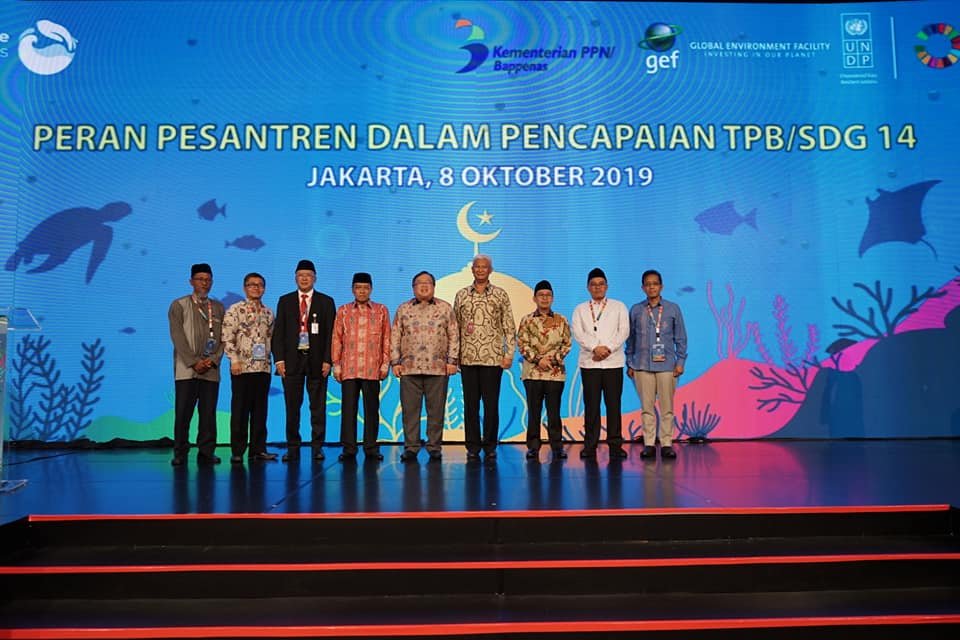 This plenary is closely related to the principle of Sustainable Development Goals (SDGs) which is “no one left behind” which is empower and involve everyone to progressively achieve the SDGs. The SDG Goal-14: Life Below Water consists of three main aspects that are compatible to each other: healthy fisheries which related to sustainable use and production of fisheries, healthy and productive marine ecosystem which related to protection and conservation of ecosystem, and wealthy fisheries which related to improvement of economic wellbeing especially coastal communities such as fishers. This is relevant for Indonesia who continues to actively optimize its national fisheries production. With its complexity, Indonesia fisheries sector needs an integrated management system that considers the integration of upstream to downstream industries, environmental and social economic aspect, and inclusive management which involve all stakeholders. One of key aspect to achieve the target of sustainable fisheries in Indonesia is by effectively implement the regional fisheries management (Wilayah Pengelolaan Perikanan) approach that consider uniqueness, strength, and diversity of marine and fisheries in Indonesia.
This plenary is closely related to the principle of Sustainable Development Goals (SDGs) which is “no one left behind” which is empower and involve everyone to progressively achieve the SDGs. The SDG Goal-14: Life Below Water consists of three main aspects that are compatible to each other: healthy fisheries which related to sustainable use and production of fisheries, healthy and productive marine ecosystem which related to protection and conservation of ecosystem, and wealthy fisheries which related to improvement of economic wellbeing especially coastal communities such as fishers. This is relevant for Indonesia who continues to actively optimize its national fisheries production. With its complexity, Indonesia fisheries sector needs an integrated management system that considers the integration of upstream to downstream industries, environmental and social economic aspect, and inclusive management which involve all stakeholders. One of key aspect to achieve the target of sustainable fisheries in Indonesia is by effectively implement the regional fisheries management (Wilayah Pengelolaan Perikanan) approach that consider uniqueness, strength, and diversity of marine and fisheries in Indonesia.
This plenary is part of the Multistakeholder Platform for Sustainable Fisheries that is launched in 25 July 2019 by Bappenas to provide a collaborative space for stakeholder to support the country efforts towards sustainable fisheries under the umbrella of SDG-14 Working Group. The platform is established through the Global Sustainable Supply Chains for Marine Commodities (GMC project) (2018-2021) implemented by BAPPENAS with technical support from UNDP financed by Global Environment Facility (GEF). The project aims to contribute to the transformation of the seafood market by mainstreaming sustainability in the value chain of important marine commodities.
Contact:
Roby Fadillah
Deputy Director of Institunalisation, Development of Marine Product, and Maritime Affairs
Ministry of National Development Planning/BAPPENAS
roby.fadillah@bappenas.go.id
Jensi Sartin
National Project Coordinator, Global Marine Commodities – UNDP Indonesia,
jensi.sartin@undp.org
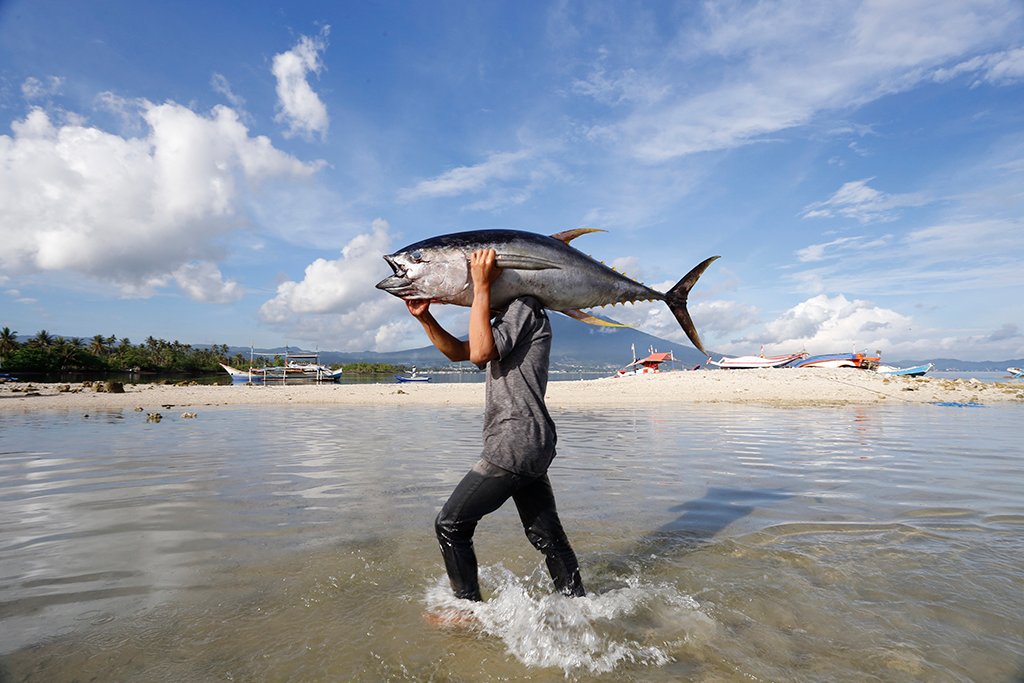 Tuna fisheries in Indonesia are of critical importance to the national economy. Between 2005-2016, Indonesia tuna production comprised approximately 19% of the total landings originating from national capture fisheries. To protect the long-term viability of the tuna fishery, the government of Indonesia is now working to establish sustainable management and conservation measures as guided by the FAO’s Code of Conduct for Responsible Fisheries (CCRF).
Tuna fisheries in Indonesia are of critical importance to the national economy. Between 2005-2016, Indonesia tuna production comprised approximately 19% of the total landings originating from national capture fisheries. To protect the long-term viability of the tuna fishery, the government of Indonesia is now working to establish sustainable management and conservation measures as guided by the FAO’s Code of Conduct for Responsible Fisheries (CCRF).
As the 2015/2019 National Tuna Management Plan enters its final year, the Ministry of National Development Planning (BAPPENAS) facilitated a workshop to support the work of Directorate of Fish Resource Management at the Ministry of Marine Affairs and Fisheries (MMAF) on the Development of the draft National Tuna Management Plan 2020/2024. This workshop was organized with technical support from UNDP through the GEF-funded Global Marine Commodities Project.
“We need to ensure the alignment of this tuna management plan with the 2020/2024 National Mid-Term Development Planning process, and also ensure alignment with SDG14” said Dr. Sri Yanti, Director of Marine Affairs and Fisheries of BAPPENAS, who is also the National Project Director for the GMC Project.
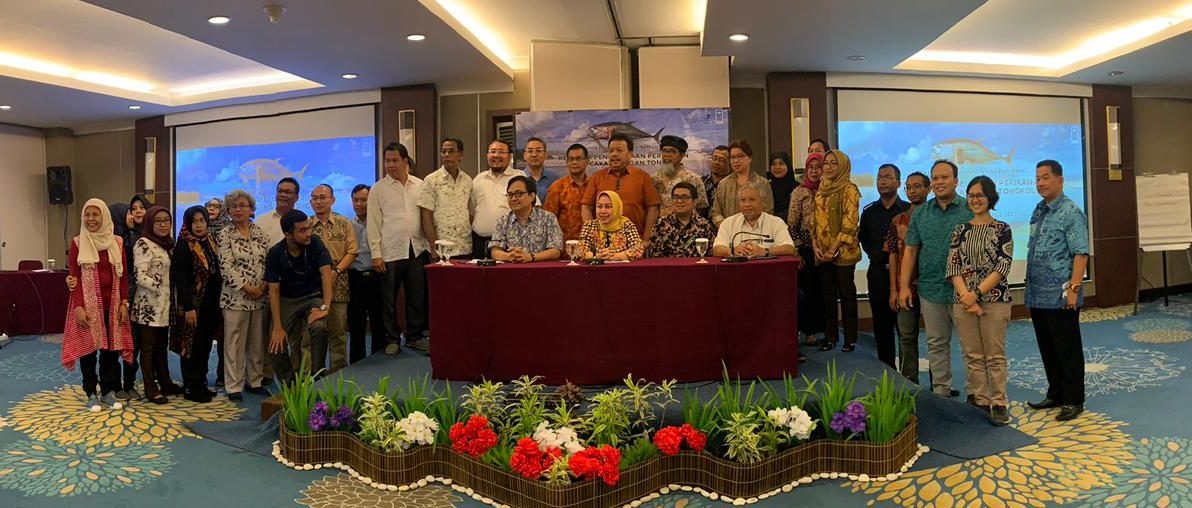
45 stakeholders from MMAF, BAPPENAS, UNDP, representatives of Fisheries and Marine Agencies in the Provincial Government, Fishing Port Authorities, tuna industry associations (AP2HI, ATLI, HNPN, ASPERTADU dan ASTUIN), and NGOs (MDPI, WWF Indonesia, TNC and Hatfield) attended the workshop. Stakeholders discussed the identified issues, indicators, proposed actions, as well as a timeline and responsible parties to implement .
During the 4-days of workshop, stakeholders identified 534 actions that will be included in the 2020-2024 Draft National Tuna Management Plan. This Plan will be finalized by MMAF and is expected to be synergized with the 2020/2024 National Mid-Term Development Planning process to determine priority programmes in the capture fisheries over the next 5-years, ensuring the sustainability and competitiveness of Indonesia tuna fisheries.
More information:
Jensi Sartin
National Project Coordinator
jensi.sartin@undp.org
As a coordinated effort to improve the management of Indonesian fishery resources, the Ministry of National Development Planning (BAPPENAS) officially launched its “Multi-stakeholder Platform for Sustainable Fisheries” as part of The Global Sustainable Supply Chains for Marine Commodities (GMC) project on Thursday, July 25, 2019.
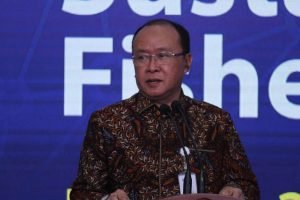
Dr. Arifin Rudiyanto, Deputy Minister for Maritime Affairs and Natural Resources at BAPPENAS
“One of the most important aspects to achieving sustainable fisheries in Indonesia is by effectively implementing a regional fisheries management (WPP) approach,” said Dr. Arifin Rudiyanto, Deputy for Maritime Affairs and Natural Resources at BAPPENAS. The launching event, held in Jakarta, Indonesia, was attended by various fisheries stakeholders including related ministries and agencies, local government, and the fishery industry, youth groups, and academics.
The GMC Project activities in Indonesia are coordinated by BAPPENAS with technical support from the United Nations Development Programme (UNDP) and funding from the Global Environment Facility (GEF). The multi-stakeholder platform is coordinated with efforts to achieve the Sustainable Development Goals (SDGs), especially Goal 14 on Life Below Water.

Sri Yanti, Director for Marine Affairs and Fisheries- BAPPENAS
“With the complexity of the challenges faced and the characteristics of capture fisheries in Indonesia, this multi-stakeholder platform is needed to agree on a shared vision, formulate strategic efforts, and jointly oversee its implementation transparently”, said Dr, Sri Yanti, National Project Director for GMC Project who also serve as Chair of SDG-14 Working Group in the BAPPENAS.
“Collaboration of all parties along the fisheries supply chain – central and local government, academics, partner institutions, youth, women, and fishers – is needed to achieve a just, independent, competitive, and sustainable Indonesian fishery,” said Sri Yanti. Speaking at the launching event, Yanti invited active participation from all fisheries through the multi-stakeholder platform to collaboratively develop a 5-year strategic program for sustainable fisheries.
In addition, the GMC project is working directly to support Fishery Improvement Projects (FIPs) in pole and line tuna as well as the blue swimming crab fishery so that these fisheries can meet internationally recognized sustainability standards in the next 1-2 years. It is expected that these two sectors of fisheries will generate lessons learned and a model for the multi-stakeholder platform in developing policy direction and in improving the sustainability of Indonesia’s fisheries.

Indonesia Multi-stakeholder Platform for Sustainable Fisheries.
The launching was followed by panel discussion with participation from Mr. Askabul Kijo, Head of Fisheries Agency from Southeast Sulawesi Province, Mrs. Janti Djuari, chair the tuna pole and line and handline industry association, who explained urgency for collaboration, Mr. Yudi Nurul Ihsan, coordinator of University network for SDG Goal-14 and Mr. Adrianto chair of Center of Excellence SDG Goal-14 from IPB University. The panelists discussed the lesson learned on governance mechanisms for fisheries management, and strategies to maintain sustainability and effectiveness of the multi-stakeholder platform.
About GMC
The GMC project is an interregional initiative implemented by the Ministries and Bureaus of Fisheries, Production and Planning of Costa Rica, Ecuador, Indonesia and Philippines, with technical support of the United Nations Development Programme (UNDP), facilitated by the Sustainable Fisheries Partnership (SFP) and funded by the Global Environment Facility (GEF).
Flickr photo gallery
More information:
Jensi Sartin
National Project Coordinator
jensi.sartin@undp.org
For thousands of years, fishing has supported the many towns and villages built along the banks of the Galician Rias, or fjord-like bays that spread inland from the Atlantic Ocean in this hilly landscape in northwestern Spain. In 2017, Galicia reported more than 200,000 metric tons of total seafood landings, which represents more than 500 million Euros in sales[1]. Over 70% of seafood consumed in Spain comes off the 4,400 registered fishing vessels in Galician ports, where the industry employs approximately 4.6% of the active population[2]
In a place whose cultural identity and the economy is so closely tied to the fishing sector, it is a government priority to ensure that fish and marine invertebrate stocks are harvested responsibly and sustainably. To prevent overexploitation of the fishery resources, the regional authorities have worked in close coordination with scientists, fisherfolk and the private sector to design management systems that are now internationally recognized for their effectiveness.
 The people and institutions involved in these successful systems shared their experiences, best practices and knowledge with public and private sector delegations from the three countries that receive support from the Global Marine Commodities (GMC) Project in an in-situ peer-to-peer knowledge exchange event organized by project facilitating partner, Sustainable Fisheries Partnership (SFP) from June 26-28 2019.
The people and institutions involved in these successful systems shared their experiences, best practices and knowledge with public and private sector delegations from the three countries that receive support from the Global Marine Commodities (GMC) Project in an in-situ peer-to-peer knowledge exchange event organized by project facilitating partner, Sustainable Fisheries Partnership (SFP) from June 26-28 2019.
“In Galicia, it is very important to properly plan for effective fisheries management. This management consists of three interacting elements,” said Marta Villaverde Acuña, Deputy Director of Fisheries and Seafood Marketing, Regional Government of Galicia.
“The first element is to have scientific data regarding the status of fisheries stocks; the second is that there must be structured mechanisms for consulting fisherfolk and arriving at a consensus about management measures; and the third is that managers consider the social and economic impact of fisheries management measures and strive to guarantee the long-term sustainability of fisheries activities.” Marta Villaverde Acuña, Deputy Director of Fisheries and Seafood Marketing, Regional Government of Galicia.
Those three “elements” were common themes throughout the peer-to-peer knowledge exchange. Ecuadorian, Indonesian and Philippine representatives from the fisheries and planning government agencies, as well as from the private sector were given the opportunity to interact directly with fisheries regulators from the Galician government, with port authorities who monitor and collect data about fish catch and sales, and with fisherfolk from Cofradias, or local fishing development organizations who participate in management plan construction.
The Cofradias were a focus point of the trip, as they represent a unique model of fisherfolk organization that participates directly in decision making regarding the management of Galician fish and marine invertebrate stocks.
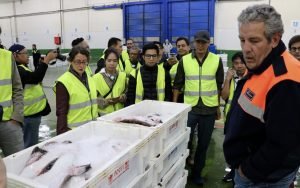
“In the Philippines, similar to the Cofradias, the Technical Working Groups (TWG) are the bodies or platforms that serve as a venue where government entities and fisherfolk can discuss about fishery management activities,” said Rafael Ramiscal, Chief of the Capture Fisheries Division of the Bureau of Fisheries and Aquatic Resources (BFAR).
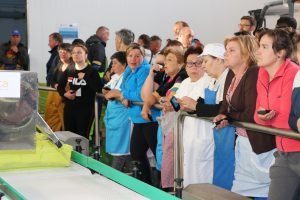 The Cofradias and Cofradia federations have been granted territorial fishing rights by the government of Galicia, and are actively involved in setting harvest quotas, monitoring fishing effort and catch, establishing bans and deciding on the distribution of fishing effort. Through its engagement with the cofradias, the Galician government has been able to effectively involve the private sector in management decision making, thereby improving compliance and facilitating data collection.
The Cofradias and Cofradia federations have been granted territorial fishing rights by the government of Galicia, and are actively involved in setting harvest quotas, monitoring fishing effort and catch, establishing bans and deciding on the distribution of fishing effort. Through its engagement with the cofradias, the Galician government has been able to effectively involve the private sector in management decision making, thereby improving compliance and facilitating data collection.
Viviana Jurado, a biologist from the Ecuadorian National Institute of Fisheries (INP), attended the learning exchange and commented that the event helped reinforce the importance of public-private partnerships to establish good fisheries management plans.
The INP is the Ecuadorian government agency in charge of studying and monitoring fish stocks within Ecuador’s national jurisdiction, and Jurado is currently working on an innovative partnership with the Ecuadorian Small Pelagic Fishery Improvement Project to study the Small Pelagic Fishery stocks.
“Galicia presents a model to learn from, in which there is a very good organization of small-scale fishers in cofradias, who are considered by the regional administration in decision-making,” said Enrique Alonso, Latin America Fisheries Director for SFP.
“The Ecuadorian industry is noticing that independent of which country you are talking about, all the participants here follow the same technical guidelines for fisheries monitoring and research,” Jurado said. “I hope to see the private sector representatives return to Ecuador and share this vision with their industry partners.
Participants were also able to visit several different lonxas or controlled seafood auction centers where catch data is collected, and artisanal and industrial fishers are provided a space to sell their catch to first buyers. At the lonxas, participants learned about the Pesca de Galicia electronic system, which was established by the regional government as a tool to collect data about fishing activities in the Galician jurisdictional waters.
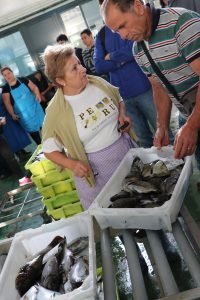 Through the Pesca de Galicia online system, fisherfolk register their fishing journeys, fishing gear utilized, location of catch, total sales by species and other data in designated ATM-like computer stations located at fishing ports across the region. The system can also provide updates to fishers regarding fishery or area closures.
Through the Pesca de Galicia online system, fisherfolk register their fishing journeys, fishing gear utilized, location of catch, total sales by species and other data in designated ATM-like computer stations located at fishing ports across the region. The system can also provide updates to fishers regarding fishery or area closures.
“Our platform ensures that we collect good information at the first sale of the seafood product, which allows us to trace the product from the location it was caught or collected and further along the supply chain,” Acuña said.
“It also ensures that we have reliable and constantly updated information about our fisheries to inform sectorial decision making. For example, the platform can help Sardine fishers track how far along they are toward reaching their total allowable catch of say 40 tons in a season. Once a week the fishers can log in to the system and check the total sum of sardines that he/she has sold this season to make sure they do not pass their limit.”
Rommel Soto, from the Philippines Cephalopods Producers and Exporters Association, said he was impressed with the Pesca de Galicia platform, which facilitates data-informed adaptive management of the Galician fisheries.
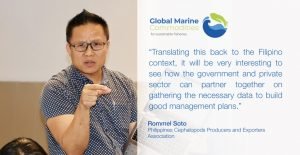
Participants also had the opportunity to share their strategies for addressing challenges related to starting up, implementing and funding the distinct Fisheries Improvement Projects (FIPs) and national platforms (dialogue working tables) supported by the GMC Project.
Regarding the national platforms, Ramiscal commented that “with support of the GMC project, the Blue Swimming Crab and the Octopus Technical Working Groups have institutionalized a form of consultative fisheries management where any management measure is constructed together as a group. This helps improve fisherfolk adoption and compliance with management measures.”
The GMC Project-supported FIPs have multi-year work plans and budgets established to implement actions needed to achieve sustainability certification from either the Marine Stewardship Council, the International Fishmeal and Fish Oil Reduction Standard or simply to improve fisheries sustainability performance of key fisheries
Marinelle Espino, from the Philippine Association of Crab Processors (PACPI), is overseeing the implementation of the Blue Swimming Crab FIP in the Philippines that receives support from the GMC Project. Espino said the primary challenge facing her FIP, which has existed for more than 4 years, is that many of the actions that have been taken to date by the FIP do not necessarily respond to the MSC pre-assessment of the fishery.
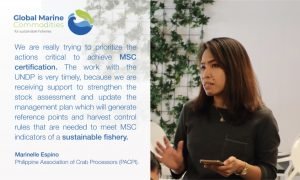
The knowledge exchange event in Galicia provided managers and seafood company representatives with ideas, tools, and models to adapt to their own contexts. Participants expressed their excitement to return to their respective countries and share their new knowledge with colleagues who participate in the GMC Project-facilitated sustainable marine commodity platforms.